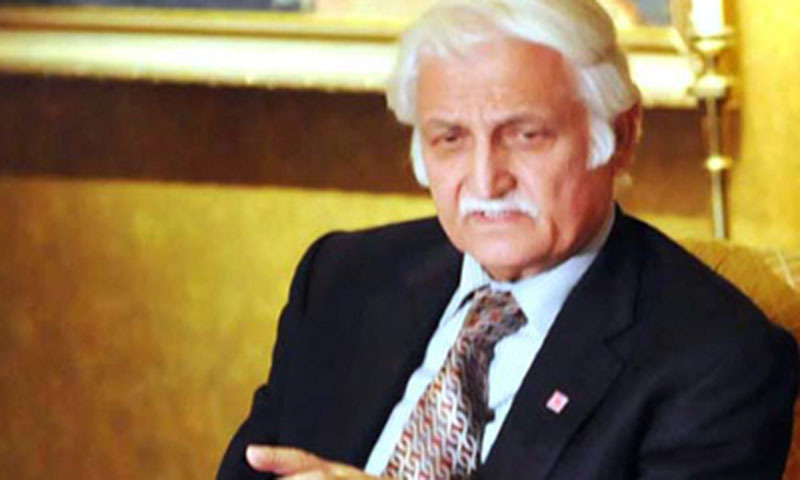ISLAMABAD: Asking the military to disclose names of at least some ‘terrorists’ killed in the ongoing military operation in North Waziristan, a key PPP senator called on Monday for a “civilian ownership” of war on terrorism.
“For the sake of credibility of Operation Zarb-i-Azb, the names of at least some of the militants be disclosed. Otherwise, doubts will continue in the minds of people,” said Senator Farhatullah Babar while taking part in a debate in the Senate on the last week’s terrorist attack on the Army Public School in Peshawar.
Mr Babar said it had been a practice since the launch of the operation in June that the ISPR (Inter-Services Public Relations) issued almost on a daily basis number of terrorists killed in various military actions. If these numbers were true, he added, up to 1,500 terrorists had so far been killed in the operation. However, he regretted, the identity of those killed had not been disclosed as yet.
Besides Mr Babar, other senators mostly from the opposition benches who spoke on the opening day of the debate, also condemned the massacre of schoolchildren and stressed the need for national unity to change extremist mindset.
Mr Babar also expressed concern over the recent visit of Prime Minister Nawaz Sharif to the Army’s General Headquarters in Rawalpindi to attend a meeting on national security.
He said there was a perception that “by default, the leadership of the war on terror has been shifted from Islamabad to Rawalpindi”. He regretted that no official hand out was issued after the meeting either by the PM Office or the ISPR.
Military asked to disclose identity of those killed in operation
“The photograph that appeared on front pages of all newspapers says it all. Who is presiding over the meeting and who is sitting nervously there like he is being tried or questioned,” Mr Babar said while referring to a picture of Army Chief Gen Raheel Sharif and the prime minister during the meeting at the GHQ.
Mr Babar also proposed a six-point “way-forward” to eliminate the monster of terrorism and militancy.
He asked the government to remove Maulana Abdul Aziz and reclaim Lal Masjid as “a symbolic step” to show the nation that “this time it means business”.
He also called for declaring the banned Tehreek-i-Taliban Pakistan (TTP) as state enemy and expose and hold accountable its supporters and apologists.
He also demanded implementation of the 2013 legislation to banish the banned outfits like Lashkar-e-Taiba which were reappearing in the garb public welfare organisations.
Mr Babar urged the government to demolish the jihadi infrastructure in the country and warned it against any “hot pursuit” in Afghanistan.
He said the TTP monsters were Pakistani nationals proclaiming to be Muslims and seeking to destroy the state to install a caliphate. “These barbarians are neither foreigners nor infidels and their agenda is the same as that of Boko Haram’s in Nigeria, Daish’s in Syria and Iraq and Al Shabab’s in Kenya,” he said.
“If bold and imaginative measures are not taken now to reverse the TTP, the future historian will, God forbid, say that Pakistan was created in the name of religion and was also destroyed in the name of religion,” he concluded.
Earlier, opening the debate, Haji Adeel of the Awami National Party regretted the delay in the launching of the military operation in North Waziristan which, according to him, should have been launched in 2011.
Hasil Bizenjo of the National Party said that no political party could disown the war on terrorism. He said both Pakistan and Afghanistan should jointly fight against terrorism.
Senator Saleh Shah said military operations would not end in the country until it stopped receiving “dollars from the US”.
Maulana Abdul Ghafoor Haideri of Jamiat Ulema Islam-Fazl blamed past dictatorial rulers for the spread of terrorism in the country. He expressed his sorrow over linking terrorism to religious parties or madressahs. He alleged that hundreds of JUI-F leaders, including Senator Khalid Soomro, and workers had been murdered. “Who attacked Maulana Fazlur Rehman?” he asked.
Senator Tahir Mashhadi of the Muttahida Qaumi Movement said the nation wanted to see execution of terrorists at public places. He termed the Peshawar incident a “failure” of the federal and provincial governments and law-enforcement agencies.
The house passed a unanimous resolution to condemn the murder of JUI-F Senator Khalid Soomro in Sindh.
Meanwhile, the Senate Secretariat on Monday sent the draft of a resolution passed by the house on Friday to condemn the Peshawar incident to the Ministry of Interior for necessary action.
Published in Dawn December 23th , 2014















































Dear visitor, the comments section is undergoing an overhaul and will return soon.